

Langage, langues et enseignement - Langage, langues et enseignement. Cité Langage UOH. ELLO. Sans titre. Bachelor thesis. Infostr.adv.lecture. Linguistics and the teacher. Felicity Conditions - Definition and Examples. Definition In pragmatics and speech-act theory, the term felicity conditions refers to the conditions that must be in place and the criteria that must be satisfied for a speech act to achieve its purpose.

Also called presuppositions. Several kinds of felicity conditions have been identified, including:(1) an essential condition (whether a speaker intends that an utterance be acted upon by the addressee);(2) a sincerity condition (whether the speech act is being performed seriously and sincerely);(3) a preparatory condition (whether the authority of the speaker and the circumstances of the speech act are appropriate to its being performed successfully). The term felicity conditions was introduced by Oxford philosopher J. L. See Examples and Observations below. How Do We Know How Languages Are Related? How the Right Words Help Us to Feel the Right Things. LSA Directory of Linguistics Programs and Departments. Welcome to the LSA Directory of Linguistics Departments and Programs.
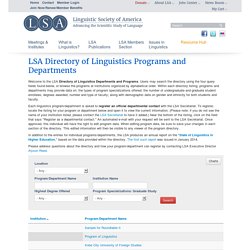
Users may search the directory using the four query fields found below, or browse the programs at institutions organized by alphabetical order. Within each directory listing, programs and departments may provide data on: the types of program specializations offered; the number of undergraduate and graduate student enrollees; degrees awarded; number and type of faculty; along with demographic data on gender and ethnicity for both students and faculty.
Each linguistics program/department is asked to register an official departmental contact with the LSA Secretariat. To register, locate the listing for your program or department below and open it to view the current information. (Please note: if you do not see the name of your institution listed, please contact the LSA Secretariat to have it added.) La langue : le H - Karambolage - ARTE. La langue : mon accent - Karambolage - ARTE. Shibboleth. Un article de Wikipédia, l'encyclopédie libre.
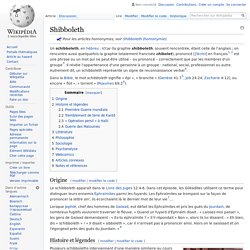
Un schibboleth, en hébreu : שִׁבֹּלֶת (la graphie shibboleth, souvent rencontrée, étant celle de l’anglais ; on rencontre aussi quelquefois la graphie totalement francisée chibolet), prononcé [ ʃibɔlɛt] en français[1],[2] est une phrase ou un mot qui ne peut être utilisé – ou prononcé – correctement que par les membres d'un groupe[3]. Ferdinand de Saussure - Wikipedia. Ferdinand Mongin de Saussure (/sɔːˈsʊər/ or /soʊˈsʊər/; French: [fɛʁdinɑ̃ də sosyʁ]; 26 November 1857 – 22 February 1913) was a Swiss linguist and semiotician.
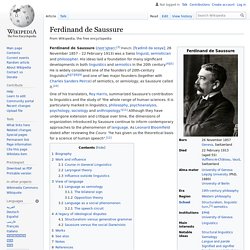
His ideas laid a foundation for many significant developments both in linguistics and semiology in the 20th century.[3][4] He is widely considered one of the founders of 20th-century linguistics[5][6][7][8] and one of two major founders (together with Charles Sanders Peirce) of semiotics/semiology.[9] Biography[edit] He was born in Geneva in 1857. His father was Henri Louis Frédéric de Saussure, a chemist, entomologist, and taxonomist. Saussure showed signs of considerable talent and intellectual ability as early as the age of fourteen.[13] After a year of studying Latin, Ancient Greek and Sanskrit and taking a variety of courses at the University of Geneva, he commenced graduate work at the University of Leipzig in 1876.
Saussure attempted, at various times in the 1880s and 1890s, to write a book on general linguistic matters. Roman Jakobson - Wikipedia. Roman Osipovich Jakobson (Russian: Рома́н О́сипович Якобсо́н; October 11, 1896[1] – July 18,[2] 1982) was a Russian–American linguist and literary theorist.
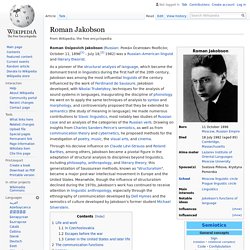
Through his decisive influence on Claude Lévi-Strauss and Roland Barthes, among others, Jakobson became a pivotal figure in the adaptation of structural analysis to disciplines beyond linguistics, including philosophy, anthropology, and literary theory; this generalization of Saussurean methods, known as "structuralism", became a major post-war intellectual movement in Europe and the United States. Meanwhile, though the influence of structuralism declined during the 1970s, Jakobson's work has continued to receive attention in linguistic anthropology, especially through the ethnography of communication developed by Dell Hymes and the semiotics of culture developed by Jakobson's former student Michael Silverstein. Pierre Bourdieu - Wikipedia. Pierre Bourdieu (French: [buʁdjø]; 1 August 1930 – 23 January 2002) was a sociologist, anthropologist,[2] philosopher, and renowned public intellectual.[3] Life and career[edit] Pierre Felix Bourdieu was born in Denguin (Pyrénées-Atlantiques), in southern France on 1 August 1930, to a postal worker and his wife.
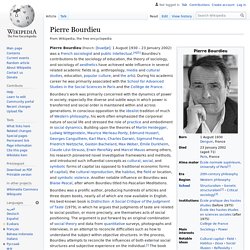
The household spoke Béarnese, a Gascon dialect. Jacques Derrida - Wikipedia. Jacques Derrida (/ʒɑːk ˈdɛrᵻdə/; French: [ʒak dɛʁida]; born Jackie Élie Derrida;[1] July 15, 1930 – October 9, 2004) was a French philosopher, born in Algeria.[4][5][6] Derrida is best known for developing a form of semiotic analysis known as deconstruction, which he discussed in numerous texts, and developed in the context of phenomenology.
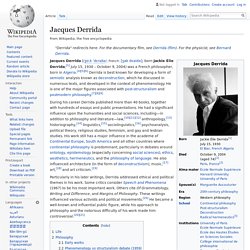
He is one of the major figures associated with post-structuralism and postmodern philosophy.[7][8][9] During his career Derrida published more than 40 books, together with hundreds of essays and public presentations. He had a significant influence upon the humanities and social sciences, including—in addition to philosophy and literature—law,[10][11][12] anthropology,[13] historiography,[14] linguistics,[15] sociolinguistics,[16] psychoanalysis, political theory, religious studies, feminism, and gay and lesbian studies. Particularly in his later writings, Derrida addressed ethical and political themes in his work.
French Language Stack Exchange. Questions de linguistique. Pourquoi ce document ?
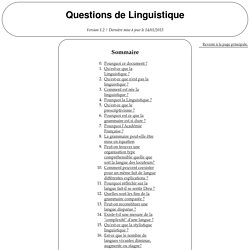
Le but de cette page est de donner des réponses aux questions de linguistique que peuvent se poser les gens, et de permettre à tout un chacun de s'instruire un tant soit peu sur ce qu'est la linguistique. J'ai l'impression qu'il y a bien moins de ressources francophones qu'anglophones sur Internet, dans ce domaine, et c'est pour remédier à ça que je me suis attelé à l'écriture de cette page. Précisons tout de suite que je ne prétends pas avoir de vérité absolue ni sur le langage, ni sur les langues, ni sur la linguistique. Il y a une part de subjectivité dans mes réponses. Et aussi une part de simplification, bien sûr. Pour poser des questions, m'envoyer des compliments des injures, écrivez-moi. Vous pouvez également laisser un commentaire sur cette page. Pour le moment la page ne contient quasiment pas de références, mais je compte bien en rajouter.